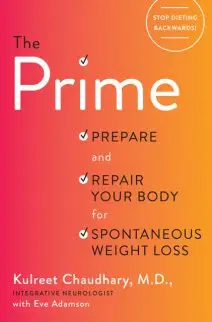
Dr. Kulreet Chaudhary, MD, author of “The Prime” says depression isn’t just a mind game, but very much a gut game too and new research is validating what ancient medicine has been focused on for centuries. Two new studies published in the journal Nature Communications found a link between several types of bacteria in the gut and depressive symptoms. Scientists are exploring whether some gut bacteria produce or consume mood-regulating chemicals, such as serotonin, or chemicals that cause inflammation in the body, which research has linked to depressive symptoms. Dr. Chaudhary is an internationally recognized expert in the ancient practice of Ayurvedic medicine (pronounced eye-yur-vayda and translated to “knowledge of life”). She says, in Ayurveda medicine, the gut and brain are one functional unit and the fastest way to shift mood is by changing diet, improving gut health and shifting your microbiome. When the gut-brain connection is disrupted—no matter what else you may add to boost your mood—you’re fighting an uphill battle.
Dr. Kulreet Chaudhary shares with your audience three Ayurvedic gut/mind actions that can spontaneously help improve mood this winter season:
• Switching inner dialogue:
• A negative mood drives the body into a state where it is constantly preparing for a war that never comes. It is the distorted perception of an impending enemy created by the mind that leads us to live a life of darkness, fear and isolation.
• To stop this, switch your inner dialogue toward a conversation that radiates hope, compassion, patience and kindness.
• An uplifted mood changes the biochemistry of the entire body towards health and happiness. When the mind is in a state of peace and mood is stable—even under tremendous external chaos—the body remains in a state of rest without exhausting its resources. When it remains in this state of rest, it becomes more resilient and it is able to repair itself efficiently.
• Herbs that help:
• Ashwagandha and brahmi are used simultaneously with herbs that strengthen digestion, such as triphala, ginger and cumin.
• Triphala is one of my all-time favorite herbs for the gut-mind axis. It has traditionally been used to heal the mucosal lining and the nerves in the gut to promote normal peristalsis.
• Prime Tea, which has been used for thousands of years by Ayurvedic practitioners for physical and mental balance. It is a simple recipe that invigorates the gut, which then directly supports a healthy mind. Simply follow the recipe below:
• Boil 4 to 5 cups of water in the morning.
• Add ½ tsp of whole organic cumin seeds, coriander seeds and fennel seeds to the hot water and boil again for at least 10 minutes with the lid on.
• Strain out the seeds and pour the liquid into an insulated container. Sip the liquid throughout the day. Start fresh with a new batch of tea each morning.
• Meditation/Mantras:
• Meditation is a practice of nonjudgmental observation, typically involving the breath as an anchor to ground yourself firmly in the present moment. This can range from focusing on your experience of breath (noticing the cool air as you inhale and the warmth as you exhale); the sound the breath makes as it moves in and out of your nose; the feeling of your chest rising and falling or your belly expanding and contracting.
• Mantras are primordial frequencies in nature that, when vocalized or repeated silently, have the capacity to heal and reshape biology. The ultimate purpose of the use of mantras is to free the individual of all outer conditioning (familial, social, political, physical, mental, etc.) that limits life.
• Take a few deep breaths and sit in silence. This allows you to integrate the energy of your mantra meditation into your body and environment without suddenly interrupting any inner process that was taking place during your meditation. It also prevents any discomfort such as irritability or headaches, which arise when you suddenly jump out of the deep state of meditation. Even when your meditation is filled with thoughts, it is still a deep mental state and you need to come out of it gradually. Slowly, after a few minutes, begin to open your eyes.
Listen to Dr. Chaundry and Mark here:



